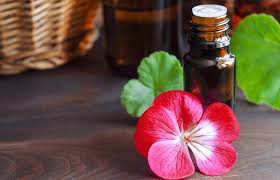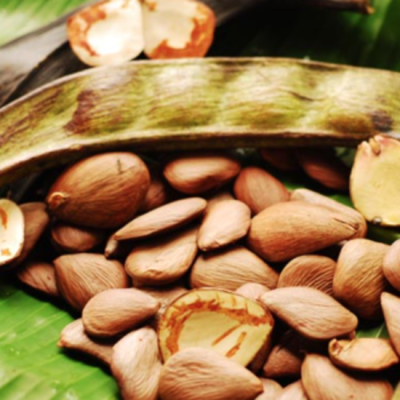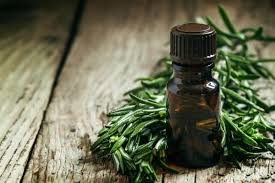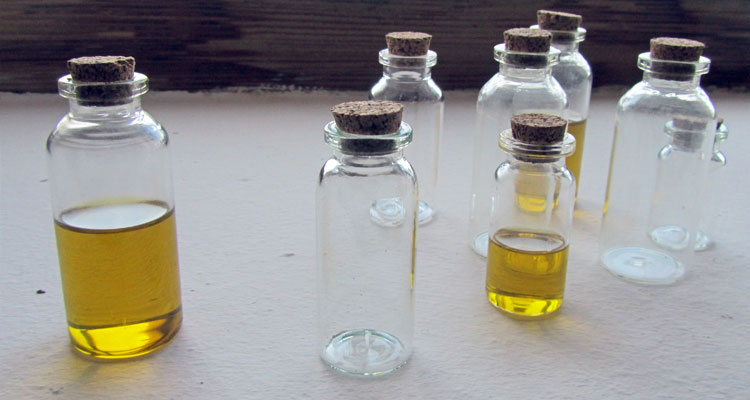Top Ten Rosemary Oil Benefits and Cures
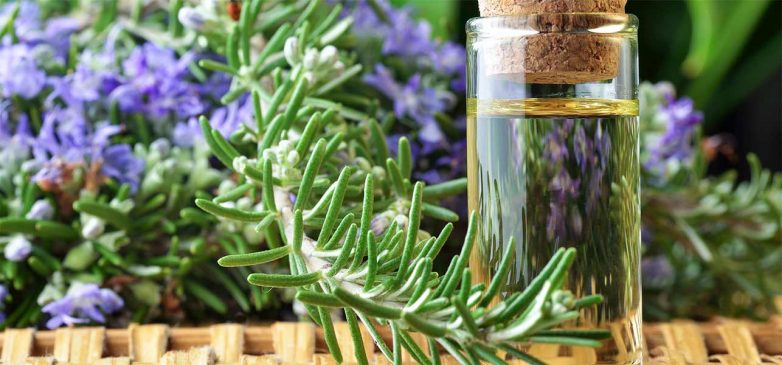
Rosemary oil is sourced from the needle-like leaves of the rosemary plant (Rosmarinus officinalis), which is a woody, perennial herb with evergreen leaves that exude a characteristic scent when broken. It belongs to the mint family and is very closely related to sage, though it is also shares a family with other herbs such as basil and lavender. Rosemary is native to the Mediterranean, but the leaves are commonly used as a culinary herb all around the world. The plant tends to not be found outside of the Mediterranean unless intentionally cultivated, but has successfully been introduced to certain areas in America and Mexico. It is quite hardy, and when combined with its pleasant scent and household utility, rosemary makes for a very popular suburban garden plant.
Rosemary is one of the oldest herbs known to man, and dates back to ancient Egyptian times, as it has even been discovered in Egyptian tombs. It has a characteristic woody, crisp and greenish scent, which can impart health benefits even on its own. The colour of rosemary oil expressed with water is a very pale, clear yellow; rosemary oil produced by infusion of the leaves in a carrier oil usually takes on the colour of the oil used.
How is Rosemary Oil Made?
Rosemary oil can be made at home, as the process is quite simple and does not require any advanced equipment. There are several different ways to go about it, depending on the type of oil desired – the easiest and most common method is by infusing a chosen carrier oil with rosemary sprigs. In order to do so, the leaves should be first be taken off the stems for greater efficiency while infusing. Add about 1 cup of the needles to two cups of the chosen carrier oil, and place the mixture in a slow cooker. Any type of oil can be used as a carrier, but the best option is a low-scent oil which can withstand high heat, such as sunflower or safflower oil, so that the rosemary essence will be able to really permeate it. The slow cooker should then be set at “low” and left for 5 to 6 hours, with the rosemary leaves turned occasionally with a wooden spoon. After 6 hours, turn off the slow cooker, leaving the oil inside to cool for about an hour. Once cooled, the rosemary leaves can be strained out, and the resulting rosemary oil should be sealed and kept in a dark place to extend its shelf life. Alternatively, the rosemary and oil mixture can be placed in a glass jar and left to steep in the sun for a week or more, before proceeding with storage in a dark area – this method can be used if a slow cooker is not readily available.
Another method is by a process known as ‘expression’, which can be done with either water distillation or steam distillation. This process can be used to express a variety of essential oils, and is usually the method used for industrial or larger-scale production of rosemary oil. When carrying out water distillation, the plant material (in this case the rosemary leaves) is immersed in water and boiled. The heat breaks down plant cells containing the essential oil, and as the water evaporates, the oil is left behind with the remnants of the leaves. The steam rising from the hot water is also a product in itself – once condensed and collected, it forms ‘floral waters’ known as hydrosols which contain the water-soluble essences from the plant material. To minimize heat damage to the essential oils produced, a vacuum is sometimes used to reduce air pressure, allowing water to boil and evaporate at lower temperatures. Steam distillation is quite similar to water distillation, with the only difference being that hot steam is used instead of water to break down the rosemary leaves.
Despite rosemary being a commonly used spice in cooking, undiluted rosemary oil should never be consumed as it can be toxic if ingested. Rosemary, dried or fresh, is generally considered safe for consumption when taken in small doses such as for flavouring, but may result in side effects such as vomiting, inflammation and internal bleeding when significantly large amounts are consumed, mainly due to its volatile oil content. Rosemary acts as a diuretic by increasing urine volume and raising the risk of dehydration. It could also interfere with the effects of blood thinning drugs, drugs for diabetes, and drugs used to regulate high blood pressure. Additionally, allergies to rosemary do exist, and thus it is best to always test a small area of skin before commencing with regular usage. Rosemary oil is not recommended for use on children under 4 years of age, as its potency may be toxic in small children. Frankincense oil is a safe and acceptable alternative in this situation for many health conditions, and advice from your general practitioner is recommended before introducing rosemary oil to your children.
History of Rosemary Oil
The name “rosemary” originates from the Latin word “rosmarinus”, which translates directly as “dew of the sea”, as the plant was commonly found growing on cliffs overlooking the sea. Rosemary is also sometimes referred to as “anthos” in ancient Greek, which literally means “flower”. The name of the genus Rosmarinus was coined by famous 18th-century naturalist and taxonomist Carl Linnaeus. The rosemary plant’s name also has its roots in Catholic myths – it was said that when the Virgin Mary was resting, she spread her blue cloak over a shrub with white flowers, and the flowers turned blue. The plant was henceforth known as “the Rose of Mary”, which then allegedly evolved into its modern name today.
The medicinal qualities of rosemary and its essential oil was no mystery even as early as the 14th century. It was a main component of Hungary water, which was a valuable remedy for many ailments such as joint pain and gout; it also served a smaller role as a fragrant perfume. Hungary water was traditionally prepared by mixing fresh rosemary sprigs with brandy, and could either be consumed or applied to the body externally. Paracelsus, a famous German-Swiss physician and botanist, also attested to the health benefits bestowed by rosemary oil. He was known for his major contributions to the field of herbal medicine in the 16th century, and believed (correctly) that rosemary oil was effective throughout the entire body, possessing the ability to heal important organs such as the brain, liver and heart.
Being far more than simply a medicinal herb, rosemary held many religious and social connotations even back in the early ages. It was considered sacred to ancient Egyptians, Romans, Greeks and Hebrews, and has been used extensively for a large variety of purposes. With its apparent relation to the Virgin Mary, rosemary was considered special and important by Roman Catholics, who frequently used it in religious ceremonies. In ancient Egypt, rosemary and its extracts were used as ingredients for incense on account of its soothing fragrance; Greek scholars often wore sprigs of rosemary believing that it would improve their memory. It was also frequently associated with wedding ceremonies in the Middle Ages, as it was possibly thought to be a love charm.
The rosemary plant serves as a symbol of remembrance in Europe and Australia, often making an appearance during war commemorations and funerals. Mourners would throw it into graves to symbolize their remembrance of the deceased, and sprigs of rosemary are worn on ANZAC Day and sometimes Remembrance Day in Australia. The symbolism of rosemary has even earned its place in classical literature – in Shakespeare’s Hamlet, a line by Ophelia reads: “There’s rosemary, that’s for remembrance, pray you love, remember.”
Uses of Rosemary Oil
- Soothing aroma
The crisp, pleasant fragrance of rosemary oil makes it a prime candidate for use as a perfume or an air freshener. Due to its fresh aroma, it can be diluted with water and used as a spray, to mask bad odours without leaving behind a sickly-sweet scent. This makes it a suitable alternative to rich, floral perfumes which can be nauseating to some people. Rosemary oil is also burnt as incense, and used as a component in shampoos and cleaning products. Some mesmerizing fragrances found in cosmetics, bath oils and candles are courtesy of rosemary oil.
- Stress and pain relief
The scent of rosemary is a potent agent for aromatherapy, known for its ability to relieve stress and even pain. This has been proven by research – a study conducted by Meikai University in 2007 measured cortisol (stress hormone) levels in healthy volunteers, after being exposed to five minutes of aromatherapy with lavender and rosemary oil respectively. They found that salivary cortisol levels dropped following the aromatherapy, and it was proposed that both essential oils could play significant roles in relieving chronic stress, subsequently preventing stress-induced chronic diseases such as headaches and obesity.
The ability of rosemary oil to relieve pain could possibly be tied to its de-stressing capabilities, as psychological stress can have negative effects on the physical body. It could also be due to the 10-20% camphor content found in the oil. Camphor is a minty substance readily absorbed through the skin, and can be rubbed into the skin for a slight anaesthetic and anti-inflammatory effect. This makes rosemary oil useful for quick relief from headaches, muscle pains, rheumatism and even arthritis, simply by massaging the oil into the affected area. Rosemary oil can also help stimulate blood circulation, and has been known to ease the symptoms of neuralgia and neuropathy.
- Improves memory and cognition
A unique property of rosemary is that its scent apparently enhances memory, and contributes to improved cognition by stimulating mental activity. This aspect of its use has been discovered quite some time ago, where Greek scholars wore it during examinations to help their memory. This has also been proven by research – a neuroscience study done by the University of Northumbria evaluated the cognitive performance of participants when exposed to lavender oil aromatherapy, rosemary oil aromatherapy, and no aromatherapy respectively. Rosemary was found to positively impact their mental performance, while the opposite was true for lavender, presumably due to its calming effect.
As a result, the use of rosemary oil as an alternative treatment for Alzheimer’s is currently being explored, as the oil’s ability to boost neural activity could possibly slow down the onset of the disease. Rosemary aromatherapy was tested on a sample of 28 elderly people with dementia, with 17 of them suffering from Alzheimer’s; the results were published in Psychogeriatrics. It was found that “patients showed significant improvement in personal orientation”, and no side effects were observed.
- Improve gastrointestinal functions
When taken internally, diluted rosemary oil can promote healthy gastrointestinal activity, easing indigestion, stomach cramps, constipation and bloating. It is also an appetite stimulant and a potent detoxifying agent for the liver. Rosemary oil is able to promote bile production, which helps with fat metabolism and lowers the odds of developing Type II diabetes. In a culinary aspect, rosemary leaves are often added to meat dishes, both for its flavour and for its ability to stimulate blood circulation, which plays a role in increasing absorption of nutrients from food.
- Antimicrobial agent
The antimicrobial properties of rosemary oil open up a whole new range of possibilities in its use. Mixing the oil in some water makes for an effective mouth wash, which helps to eliminate bad breath and prevent a variety of dental conditions caused by bacteria in the mouth. It has also been suggested by recent research that rosemary oil could relieve inflammation caused by the herpes virus, possibly even making the virus less contagious.
- Relief for respiratory problems
The camphor content in rosemary oil is the primary contributor to its ability to treat respiratory problems, as camphor is well known as a decongestant, especially when paired with menthol. Inhaling the scent of rosemary oil can relieve nasal and throat congestion, which could occur as a result of respiratory allergies or mundane reasons such as catching the flu. The mildly antiseptic quality of the oil also makes it effective in treating common respiratory infections.
- Hair care
Rosemary oil is a popular essential oil for use in hair care, being found in many shampoos and hair lotions. This is mainly because the oil is able to stimulate follicles for increased hair growth, making hair stronger and healthier following regular application. The oil is applied by massaging it into the scalp, and is sometimes combined with olive oil for more effective hair treatments. The ability of rosemary oil to increase blood circulation means that it is able to promote blood flow in the scalp, which helps with timely renewal of cells and hair. The increased blood flow, when combined with the moisturising and antimicrobial effects of rosemary oil, lessens unsightly scalp conditions such as dandruff and dry scalp. Rosemary oil can also be combined with tea tree oil and basil oil for further treatment options. The general benefits that rosemary oil treatments impart include a reduction of hair loss from brushing and shampooing, and slowing of both greying hair and male pattern baldness.
- Skin care
Rosemary oil is not as prominent in cosmetic applications for skin care as compared to hair care, as it is mostly used for its medicinal qualities and for providing symptomatic relief. However, its antimicrobial qualities can still be put to use in treating minor skin problems such as eczema, dermatitis and acne, thus helping to improve one’s complexion. Like just about any oil-based product, rosemary oil comes with moisturizing qualities, which makes it a suitable option for use in preventing dry skin when applied topically.
- Boosts the immune system
Antioxidants in the body are incredibly valuable in fighting disease and slowing the onset of aging, making foods and essential oils that contribute antioxidants highly sought-after. The same study done to measure how rosemary oil affects cortisol levels also found that the oil functions as an antioxidant by controlling free radical activity in the body. Free radicals are unstable molecules, which are formed by uneven breaking of chemical bonds. In order to achieve the needed stability, the free radicals “attack” other nearby compounds, damaging them in reactions in an attempt to steal the needed electrons. Upon losing its electron to the free radical, the “attacked” and damaged molecule becomes a free radical itself, resulting in a chain reaction where the cell structure ends up damaged beyond repair. Antioxidants prevent this chain reaction by donating electrons to the free radicals, stopping them in their tracks. This suggests that regular usage of rosemary oil in aromatherapy, massage or in consumption can give the immune system a boost by preventing free radical damage, and combating diseases associated with free radicals such as cancer and heart disease.
- Other uses
There are many other unproven claims regarding the health benefits of rosemary oil, which include being a remedy for peptic ulcers, sperm mobility, leukaemia, kidney stones, and cataracts. Other suggested uses of the oil are as treatments for disorders in the menstrual cycle, and as a supplement to maintain a healthy heart and prostate. Research is currently under way to investigate the potential of rosemary oil as a treatment for certain types of cancer.
The addition of rosemary extract has also been shown to extend the shelf life and stability of some omega 3-rich oils, which can easily turn rancid otherwise.
References:
https://en.wikipedia.org/wiki/Rosemary
https://www.organicfacts.net/health-benefits/essential-oils/health-benefits-of-rosemary-oil.html
https://en.wikipedia.org/wiki/Hungary_Water
https://draxe.com/rosemary-oil-uses-benefits/
http://www.umm.edu/health/medical/altmed/herb/rosemary
http://www.webmd.com/vitamins-supplements/ingredientmono-154-rosemary.aspx?activeingredientid=154&
http://www.healthchecksystems.com/antioxid.htm


